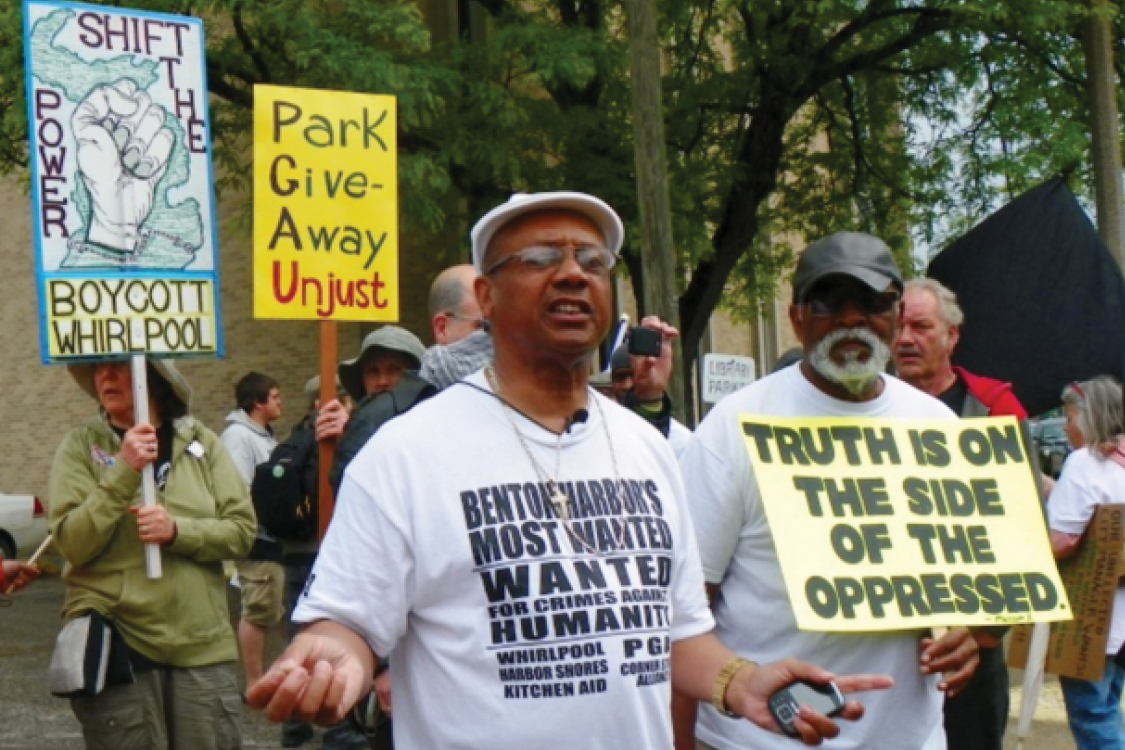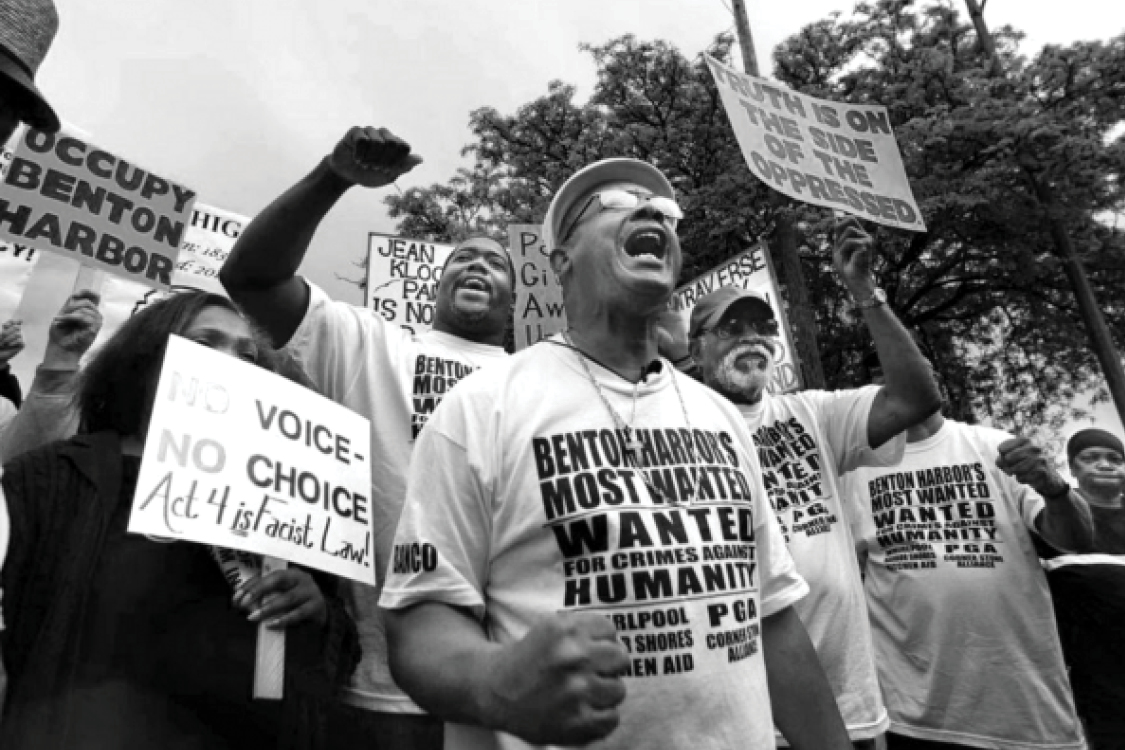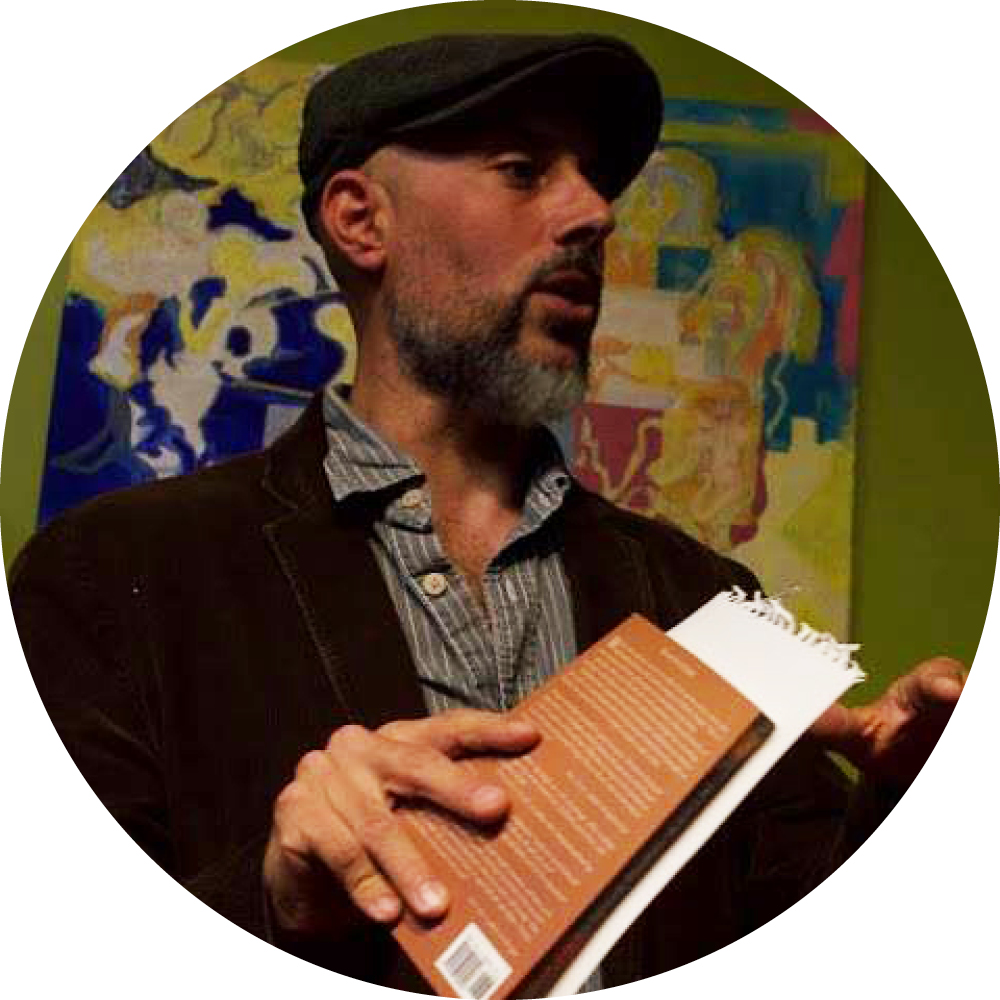Two Towns, Two Americas:
The Story of Rev. Edward Pinkney
By Paul Sakol
I arrived at the small home of Reverend Edward Pinkney in 2014. A short man in a small town, Rev Pinkney has a big voice. He came out to greet us confidently on his front lawn wearing a T-shirt that matched the signs on his lawn condemning Whirpool’s corporate greed and the segregation and poverty that has plagued Benton Harbor, Michigan for decades. Rev Pinkney seemed unworried by the powerful forces he was confronting: a government that was controlled largely by corporate interests.
Rev Pinkney took us on a tour of Benton Harbor. We saw vacant lots and dilapidated housing. Its residents were almost all black and poor. Juxtaposing this were the corporate headquarters of Whirlpool. Just over the river was the town of St. Joseph, white and prosperous. Benton Harbor and St Joseph are two small towns in southwest Michigan separated by a river. And while the St. Joseph River may not be as wide as the Mississippi, there is perhaps no better symbol for the racial divisions in America.
The problems in Benton Harbor/St. Joseph, Michigan are not only racial. They are also problems of class. This article is about these two towns. It is about Reverend Edward Pinkney and his organization, BANCO (Black Autonomy Network Community Organization), fighting Whirlpool Corporation and other big corporate and political powers. It is about being imprisoned twice on false charges of voter fraud – and what this says about our criminal justice system.
To quote Joe Peery, a supporter of Reverend Pinkney who lives in public housing in the Cabrini Green area of Chicago, “This is not just a black problem, it is an American problem.” In the case of Cabrini Green, the situation deteriorated when major factories left – Montgomery Ward, Turtle Wax, Oscar Mayer, and Seeburg. In Benton Harbor, the last local plant belonging to Whirlpool Corporation closed down in 1987. At one time, Whirlpool was the supplier of over 2,000 blue-collar jobs. V-M Corp., Superior Steel Casting Company, Michigan Standard Alloys, Clark Equipment (Benton Township), and Auto Specialties also shut their doors in Benton Harbor in the 1970s and 1980s. As Alex Kotlowitz wrote, “the very industries that had lured Southern Blacks were gone, and many families had no option but the public dole.” [1]
To understand the story of Reverend Pinkney, one must first understand what has happened in Benton Harbor/St. Joe over time. This is happening in other places in the U.S. where big factories have closed down. Reverend Pinkney and BANCO have been fighting poverty, unemployment, classism, racism and gentrification.
1
Two Towns; Two Americas
For the first half of the 20th century, Benton Harbor was the more prosperous of the two towns. For many years, Benton Harbor’s main sustenance was fruit-growing and selling cherries, apples, peaches, grapes, and apricots. Later, it became home to a number of manufacturing plants – mainly in the area of automobile foundries and auto parts plants, but also in do-it-yourself radio kits and Whirlpool appliances. And it prospered as a vacation destination for Chicagoans to escape the hot, humid summers.
In the 1960s and 1970s, a combination of forces not all unique to Benton Harbor drained the town of its prosperity. [2] These forces included:
1
A newly constructed mall lured clothiers and department stores from the downtown.
2
Global competition made many of the foundries and auto parts stores locally go out of business.
3
Urban renewal scattered the black population around the town. They had for the most part been in one distinct section of town.
4
Many whites, uneasy with their new neighbors, fled. Some simply skipping over the river to St. Joseph. Institutions including the YMCA, the newspaper, and the hospital followed. Benton Harbor’s oldest church split into two churches—half the congregation remained in Benton Harbor, the other half went to St. Joseph. “It has been said that even God fled the black tide by crossing the river.” [3]
As of the census of 2010, the population of Benton Harbor was 10,038, down from 19,136 in the 1960 census. The population drop pretty well followed the disappearance of the factories and businesses. Over that period, there has been a significant increase in poverty, unemployment, and vacant and run-down houses.
The Whirlpool Corporation has played a major role in the downturn of Benton Harbor. Even though they have had no factories there since the 1980s, their corporate offices are located there, and they are spending plenty of money to expand and spruce up their facilities. They pay no taxes and are not employing people from Benton Harbor. They are building fancy homes around their offices while houses in the main part of Benton Harbor are vacant or need major repairs. There is also vacant land where houses used to be. Overall they are making a large effort to gentrify the area by getting rid of the poor people who are mostly black.
The Piece De Resistance is that the powers that be have used the Emergency Financial Manager for Benton Harbor (appointed by the Governor of Michigan) to overturn the use of a park (Jean Klock Park), which was deeded to the city in perpetuity for the use of the population of Benton Harbor as a whole, and build a private golf course. Even if they could afford to use the golf course – which they can’t – the people of Benton Harbor have more pressing needs; this is clearly not one of them.
Throw in three other major influences:
1
The Federal Congressman who represents Benton Harbor is Fred Upton. The Upton family are the owners of Whirlpool Corporation. Upton is a very conservative Republican.
2
For the last decade in Michigan, there have been Emergency Financial Managers (EFM) in a number of cities. Benton Harbor is one of those cities. The EFM is appointed by the governor of Michigan. He can overrule any decision made by the democratically elected officials. Effectively, the city is no longer a democracy. Michigan has had an EFM law since 1990. However, a law that gave the EFM much more power was passed in 2011. That law was overturned by a referendum of the voters in 2012. Then Governor Snyder put in an even stronger EFM law in 2012 This law was made much more difficult to overturn by referendum.
3
Until lately, the Mayor of Benton Harbor was James Hightower who was a stooge of the Whirlpool Corporation.

2
Reverend Pinckney
Reverend Edward Pinkney has been at the forefront of the fight for justice in Benton Harbor, particularly against corporate power: As he bluntly puts it, he is fighting “against the giant Whirlpool Corporation that runs the city and region.” [4]
Reverend Pinkney was the leader in forming an organization called BANCO (Black Autonomy Network Community Organization). BANCO has been in existence for at least 13 years. It is supporting his work for the average person in Benton Harbor. One participant says that there have often been 100 people at meetings he has attended.
Reverend Pinkney has been in prison twice on charges related to voter fraud. The first time Pinkney “got into trouble” he and BANCO were fighting the proposed takeover of Jean Klock Park. This was an effort to gentrify the area and was of no benefit to the average citizen of Benton Harbor. Reverend Pinkney successfully engineered the recall campaign of Glenn Yarborough, the boss of Benton Harbor who was working with the power structure of the area, which included Whirlpool Corporation and Cornerstone Alliance.
Then, Reverend Pinkney was accused of voter fraud – buying votes for $5 at a soup kitchen. This was not proven. Because of this supposed voter fraud, the recall of Yarborough was thrown out. Pinkney was brought to trial for this “offense”. The jury had two black jurors. The verdict in this case was a hung jury on all 5 counts.
In March, 2007, Pinkney was retried. The jury was all white. This time, Reverend Pinkney was found guilty. The sentencing was to take place on May 14, 2007. Interestingly, in April, Pinkney took a lie detector test and passed on all issues. In May, 2007, Pinkney was sentenced to one year in jail and 5 years of probation. Pinkney was placed on a tether in May, 2007 and confined to his home for one year.
After the publication of an article written by Pinkney in The People’s Tribune newspaper, he was taken from his home and placed in the Berrien County jail in St. Joseph. In the article, Pinkney quoted Chapter 30 of Deuteronomy, which reads that God will punish those who persist in the path of injustice.
The Lord your God will change your heart and the hearts of all your descendants, so that you will love him with all your heart and soul and so you may live. The Lord your God will inflict all these curses on your enemies and on those who hate and persecute you.
Pinkney was found to be in violation of his probation for “threatening the trial judge”. This happened on July 26, 2008. He was ordered imprisoned for 3 to 10 years. The charges were overturned by Michigan Court of Appeals in late 2008.
The latest trial of Reverend Pinkney happened in the fall of 2014. This time it was claimed that he had changed names and dates on petitions for a recall election of Mayor James Hightower of Benton Harbor. Pinkney and Banco wanted to recall Hightower because he refused to support a local income tax measure designed to create employment for the people of Benton Harbor. In addition, “Hightower is often accused by residents of Benton Harbor of being more concerned about the well-being of Whirlpool Corp. and of her business interests than the people he is sworn to protect and serve.” [5]
The jury again was all white.
During the five-day trial, not one witness said that they saw Pinkney change any dates or signatures on the recall petitions. During the opening arguments, the Berrien County Prosecutor told the jury that they would not hear anyone say that they had witnessed the defendant engaging in fraud. [6] “The prosecutor’s case was supposed to be based on circumstantial evidence. Nonetheless, the tenor of the questioning by the prosecutor seemed to suggest that BANCO was actually on trial for its uncompromising opposition to the role of Whirlpool Corp. and its supporters within the political establishment in Benton Harbor and its environs.” [7]
Reverend Pinkney was found guilty on all five counts of voter fraud in December, 2014 and was sentenced to 2 and 1/2 to 10 years in prison. Judge Schrock said he was going to “make an example” of Reverend Pinkney. Reverend Pinkney has already served 18 months in prison as of June, 2016. On May 11, 2016, a three-judge panel of Michigan’s Court of Appeals held a hearing on Pinkney’s request to overturn the decision. As yet, the Court of Appeals has not arrived at a decision.
“Life inside prison has been hard and stressful on the 67-year-old political prisoner. On Oct. 6, 2015, he was transferred from Lakeland Correctional Facility, just a few hours drive from his home, to Marquette Prison in Michigan’s Upper Peninsula. As a practical matter, this drastically cut the number of visits he could receive from family and friends. Rev. Pinkney immediately faced threats and harassment from the remote prison’s guards. At the end of October, his telephone privileges were cancelled for six months. Rev. Pinkney was “ticketed” for “having a Bible in his bed,” “having too many legal documents in his cell” and “smuggling,” among other bogus charges. He was able to beat many of these charges at internal prison hearings.”

3
Conclusion
Sadly, Rev Pinkney’s situation is nowhere near unique. In spite of the obvious gains made in the last several decades, American society at large remains deeply divided along racial lines. It is as if the St. Joseph River flows all over America. Rev Pinkney’s case is an example of the prison system used as a means of racial control, replacing Jim Crow just as Jim Crow replaced slavery. [8] This happens both through legal means – laws created that target black men – and cultural ones: All-White juries for whom the defendant, in spite of the evidence or lack thereof, just looks guilty.
But it would be a mistake to look at the situation as only racial. Race and class have always been interrelated in American society and this remains the case. Benton Harbor is suffering due to broader economic factors that have led to extreme income inequality and a shrinking middle class. Working class towns like Benton Harbor have been decimated. And the structural racism of our society has meant that African Americans have suffered disproportionately.
Finally, it cannot be ignored that Michigan and Benton Harbor are profound examples of privatized, corporate-controlled government. Reverend Pinkney’s struggle is as much for democracy itself as it is for social, racial, and economic justice in Benton Harbor. It is no accident that voting rights is what landed him in prison. The truth is that his people have little representation in their government.
At the time of publication, Rev Pinkney remains in prison in the Upper Peninsula of Michigan, awaiting an appeal. The town of Benton Harbor remains a high poverty, high unemployment, racially segregated area. While there has been a new mayor elected who is much more favorable in the eyes of the average citizen of Benton Harbor, he has virtually no power due to the Emergency Financial Manager. The power of Whirlpool Corp. remains as dominant as ever.
[1] Kotlowitz, Alex, “The Other Side of the River”, Doubleday, N.Y., 1998.,
[2] ibid pages 29-31
[3] ibid page 31
[4] People’s Tribune, Chicago, IL 6/4/10
[5] Worker’s World, Nov.7,2014
[6] ibid
[7] ibid
[8] Alexander, Michelle, “The New Jim Crow: Mass Incarceration in the Age of Color-blindness” The New press, 2010
About The Author
Paul Sakol
Paul Sakol was the Executive Director of the Blue Gargoyle Social Service Agency in Hyde Park covering the south side of Chicago from 2002 to 2007. He was the Executive Director of the Lupus Foundation branch in Illinois 2009 to 2011. He is a social worker who did psychotherapy and administration for various mental health and social service agencies in Chicago and northeastern Indiana. He worked for the Federal Government in DC for 9 years early in his career for HUD and the OMB. His education includes an MBA and an MA in Social Work both from the University of Chicago. He is an LCSW in the State of Illinois. He is fortunate to have as his partner, Hilda Schlatter. He is also fortunate to have three daughters – Liz, Karen and Sara – and seven grandchildren and two greyhounds.
Re-sources
Re-Imagining Education

Empowering educators to take a deeper look at the stories told in our schools and to re-imagine them in transformative and
nurturing learning spaces.
Learning Opportunities

Classes, workshops, and lectures that help to empower people to re-imagine who they are and their place in the world.
Get Involved

Help the Chicago Wisdom Project realize its mission to re-imagine education through holistic programming that transforms individual, community and world through creative expression.
